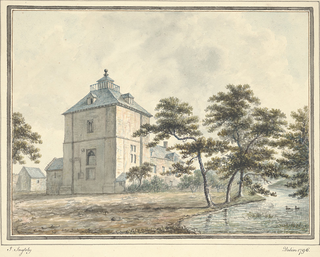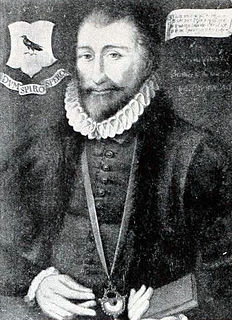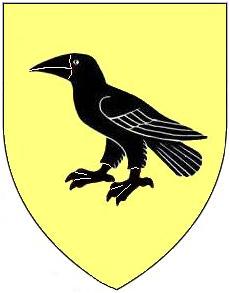This page is based on this
Wikipedia article Text is available under the
CC BY-SA 4.0 license; additional terms may apply.
Images, videos and audio are available under their respective licenses.
Corbett is an English-language surname. It is derived from the Anglo-Norman French, Middle English, and Old French corbet, which is a diminutive of corb, meaning "raven". The surname probably originated from a nickname referring to someone with dark hair or a dark complexion like a raven's. The surname was brought to England from Normandy, and spread to Scotland in the 12th century, and into northern Ireland in the 17th century. Early instances of the name are Corbet in Shropshire, recorded in Domesday Book in 1086; Corbet in Shropshire, recorded in the Assize Rolls of Worcestershire in 1158; and le Corbet in Oxfordshire, recorded in the Eynsham Cartulary in 1323. Variations of the surname include: Corbet, and Corbitt. Corbett is sometimes an Anglicised form of the Irish surnames Ó Corbáin and Ó Coirbín, which mean "descendant of Corbán" and "descendant of Coirbín", respectively.

There have been six baronetcies created for members of the Corbet family, four in the Baronetage of England, one in the Baronetage of Great Britain and one in the Baronetage of the United Kingdom. All creations are extinct. The recipients were descendants of the ancient Norman family of Corbet which held substantial estates in Shropshire including Wattlesborough, Caus Castle, Moreton Corbet Castle and Acton Reynald Hall.
John Corbet may refer to:
Edward Corbett may refer to:
Panton Corbett was an English Tory politician from Shropshire.

Sir Vincent Corbet, 1st Baronet was an English lawyer and politician who sat for Shropshire in the House of Commons in the Short Parliament of 1640. He fought on the Royalist side in the English Civil War.
Robert Corbet was a Royal Navy officer.
Richard Corbet was an English bishop and poet.

The Corbet family is an English family of Anglo-Norman extraction that became one of the most powerful and richest of the landed gentry in Shropshire. Corbet is supposed to have been first recorded in Pays de Caux, Normandy, as the name of a Norman baron named "Corbet le Normand" who was born in the early 11th century. The name Corbet derives from the Anglo-Norman French word corb, meaning "crow." It is a diminutive form, hence meaning "little crow". The modern French word corbeau is generally translated as "crow". Variants of the name include: Corbet, Corbett, Corbitt, Corbit, Corbetts, Corbete, Corben and possibly the variant of Corbin. It has cognates in other languages: the Spanish name Cuervo, for example, which generally means a raven or rook. The underlying derivation is from the Latin word corvus, crow. Generally it is thought to be a jocular reference to a person who was thought to resemble a crow: in hair colour, tone of voice or shape of nose. However, the Scandinavians believed that a raven on the battlefield was a beneficial omen and ensured victory.

Wattlesborough Tower is a ruined fortified 13th-century manor house or Tower House in Shropshire.
It is situated close to the boundary with Powys in Wales. Wattlesborough is a former township within the present parish of Alberbury. The castle is a Grade 1 listed scheduled monument. The Tower comprises a square two-storey tower above an undercroft surrounded by a moated enclosure with a fishpond. The Leighton family inherited Wattlesborough in 1471 and used it as their chief residence until circa 1711. At that time an adjoining farm building was constructed and named Wattlesborough Hall.

Sir Andrew Corbet was a prominent English Protestant politician of the mid-Tudor and early Elizabethan periods: a member of the powerful Council in the Marches of Wales for a quarter of a century. Drawn from the landed gentry of Shropshire and Buckinghamshire, he was twice a member of the Parliament of England for Shropshire.
Andrew Corbet (1580–1637) was an English MP who opposed the absolutist tendencies of Charles I.

Richard Corbet was an English landowner and politician who represented Shropshire in the parliaments of 1558 and 1563.

Reginald Corbet was a distinguished lawyer in four reigns across the mid-Tudor period, and prospered throughout, although he seems to have been definitely Protestant in sympathy. He was appointed serjeant-at-law and Justice of the King's Bench. He represented Much Wenlock in the parliament of 1542 and Shrewsbury in the parliaments of 1547, October 1553 and 1555. He enjoyed great wealth, partly because his wife was an heiress of Sir Rowland Hill, the first Protestant Lord Mayor of London.

Jerome Corbet was an Elizabethan politician and lawyer of Shropshire landed gentry background. A brother of Sir Andrew Corbet and, like him, a supporter of the Elizabethan Religious Settlement, he became an MP for Bridgnorth and a member of the Council in the Marches of Wales.

Robert Corbet was an English politician who supported Parliament in the English Civil War. He was a member of the Shropshire county committee, responsible for pursuing the war against the royalists and represented Shropshire in the First Protectorate Parliament. He is particularly known as the employer and mentor of Richard Gough, author of the Antiquities and Memoirs of the Parish of Myddle, a pioneering work of ethnographic literature, in which he is mentioned repeatedly.

Robert Corbet (1383–1420) of Moreton Corbet, Shropshire, was an English soldier, politician and landowner who represented Shropshire twice in the House of Commons of England. A retainer of Thomas FitzAlan, 12th Earl of Arundel, and implicated in his alleged misrule in Shropshire, he accompanied his patron to the Siege of Harfleur and suffered a temporary eclipse after his death.








